Last updated on January 3, 2023
If you don’t get enough oxygen, you are starving both your lungs and your heart. It’s a twofer!
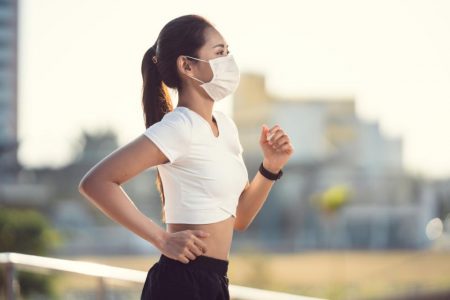 We’ve all read about the runners in China while wearing masks – at least, the reports they have leaked about running.
We’ve all read about the runners in China while wearing masks – at least, the reports they have leaked about running.
A young man of 26 had a lung collapse. It even pushed his heart aside! And 2 Chinese boys died within a week of each other in gym class while wearing masks.
Of course, even without a mask, people can collapse. Two runners in an Austin marathon had cardiac arrests in January. Quick action by nearby paramedics brought them back to life. (The American Health Association says heart attacks affect only about 1 in 50,000 runners, and a high proportion are in marathons.)
Just a few minutes before I published this article, the New York Times chimed in. They added nothing new or helpful. Basically, they said it’s very unlikely any virus lives outside (duh!) and if someone yells at you for no mask, they are expelling more saliva than you. :)
Don’t worry, you’re not like runner Jim Fixx!
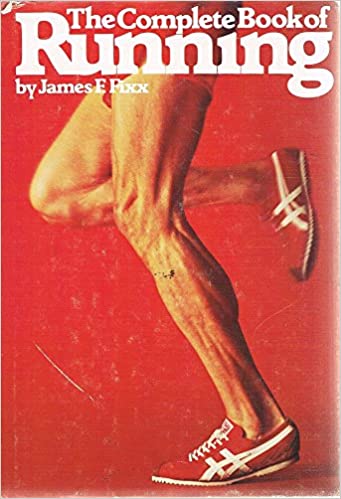 There are lots of new runners since Covid19 stay-at-home chains have shackled us and gyms have shut down, at least here in Los Angeles. And most new runners have heard of famous runner Jim Fixx, who died of a heart attack while running, at age 52. His best-selling book, The Complete Book of Running, inspired many to get off the couch and try something free, just outside the front door!
There are lots of new runners since Covid19 stay-at-home chains have shackled us and gyms have shut down, at least here in Los Angeles. And most new runners have heard of famous runner Jim Fixx, who died of a heart attack while running, at age 52. His best-selling book, The Complete Book of Running, inspired many to get off the couch and try something free, just outside the front door!
Of course, it made for a lot of headlines, then, when he died doing his healthy love. But he had a sketchy medical past, it turns out.
Despite running many miles each week, Mr. Fixx had heart disease that blocked his arteries. In addition to having a family history of heart disease, Mr. Fixx had been a heavy smoker and he had been significantly overweight for many years before he began running. He also was known to have continued eating a diet high in saturated fat despite his devotion to running. He had a high-stress job and he had gone through 2 divorces, stressors which also may have contributed to his heart disease.
That’s probably not you, though, right?
But let’s look at the stringent orders here in California and elsewhere to wear a mask while you’re working out or running? I still see at least half the runners obeying this order, and I wonder why. it makes no sense to sacrifice your own heart health for the rare possibility that you could give the coronavirus to some other healthy runner. Masks will always make it harder to breathe, but exactly how much will it affect your performance?
Isn’t it dangerous to run wearing a mask? Here’s what the experts say.
I have been genuinely curious on why and how runners use masks. The obedient media pumps out lots of photos of obedient runners with masks on, but what’s in it for the runners? Who thinks that breathing less oxygen and more carbon dioxide can help your health or your workout?
From Straits Times:
Dr Leong Hoe Nam, an infectious diseases expert who practises at Mount Elizabeth Novena Hospital, said that exercising with a mask could jeopardise one’s health.
He said: “When you put on a mask, there is resistance in breathing, making the exercise more strenuous and it can trigger a heart attack.”
We know that masks inhibit performance of anyone who is physically active. One interesting study at ncbi notes a decrease in performance across the board, especially for those exerting themselves.
Respirators have been found to interfere with many physiological and psychological aspects of task performance at levels from resting to maximum exertion.
Although the protective mechanisms of respirators are largely physical and sometimes chemical, wearing respirators come with a host of physiological and psychological burdens
They go on to say that masks interfere with respiration, thermal equilibrium, vision, communication, (and on the phone!), feelings of well-being, and necessities like eating or sneezing.
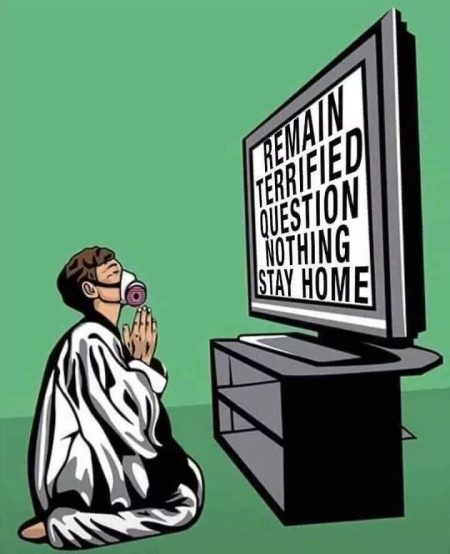 What a popular running magazine admits about wearing a face mask
What a popular running magazine admits about wearing a face mask
Runners World says, Sorry, running with a mask on doesn’t count as hypoxic training!
“Running with a mask, or any other type of face covering, is inherently more difficult because you have to work harder to get the same amount of air into your lungs,” confirms Timothy Lyman, certified personal trainer.
Hannah Daugherty, fitness expert, notes:
“Wearing a mask will make you breathe harder and increase your heart rate, while improving the strength of your diaphragm.”
The article warns that your mask will get damp, which also makes it less effective, and recommends trying “nasal breathing.”
Neither expert is a doctor of course, so everyone should consider whether the extra burden on your heart is worth it. A commenter there adds:
I hear holding your breath the whole time you runs does the same thing. Just don’t breath. Ever. It may be hard at first, but think of it as similar to the effect of running a flat route after several weeks of hill training: Your body adapts to the tougher condition and will likely perform better once it returns to the easier condition.
Another runner adds:
I think there is a lot of conflicting, and downright bad, advice in this article. It might be fine for a casual runner who is just going out to get some exercise, but none of the things mentioned in this article are good for someone training seriously. The point of training at different intensity levels is that you make both neuromuscular and cardiovascular adaptations. By slowing your pace because you simply can’t get enough air through a mask may help improve (debatable) your cardiovascular efficiency, it will not do anything to improve muscle function.
Cnet on exercise with face covering
Cnet says, to make sure you’re getting enough oxygen, get an oximeter if you wear a mask. Of course, this won’t tell you how your heart is doing.
Physical therapist Graysom Wickham says:
“The next best thing is to simply listen to your body,” he says. “If you experience lightheadedness, dizziness, extreme shortness of breath or numbness and tingling, you need to stop exercising and sit down and take a break.”
Listen to your body…sounds suspiciously like isolate yourself if you feel sick. We’re all doctors and virologists now.
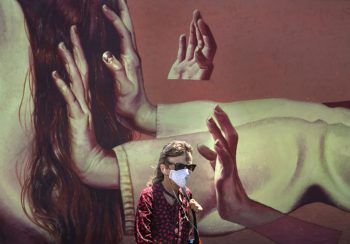 An occasional runner at The Cut has at least done some research on maskers.
An occasional runner at The Cut has at least done some research on maskers.
But before I’m halfway up the hill across the street, I feel like I’m drowning in a curtain. My exhales are insufflated up my nose, my inhales are nonexistent, and the bandana goes dark with steam. It feels like an anxiety dream.
Adding an initial barrier to fresh oxygen is — in the words of ultra-marathoner Jessica Adkins — “quite anxiety producing.” You’ve stuck your face in a little grotto filled with your carbon-dioxide exhaust.
She goes on to discuss snot and the damp, virus-friendly mask.
Dr. Christina Buchanan, a professor at Western Colorado University and the director of the High Altitude Exercise Physiology graduate program, refers to this damp cave effect as “a little biosphere over your mouth.”
And she quotes Dr. Benjamin Levine:
“When you struggle to breathe, you steal blood from the exercising muscle. You can’t work as hard. You reduce efficiency and outcome of workout. So I think it’s a terrible idea.”
In the hopes of wrapping this up today – after all, it’s another curfew here in Los Angeles!!- I did a lot of research for this because I run myself, and I know how masks fail. I’m a slow runner, a few times a week – for 15 years. I’ve also worn masks in the studios, and I know how they hurt your breathing. I see great results from my runs – both physically, and mentally – and I’m not about to ruin it with a mask.
But, as the kids say, you be you, and make your own decisions. Or make a mask!
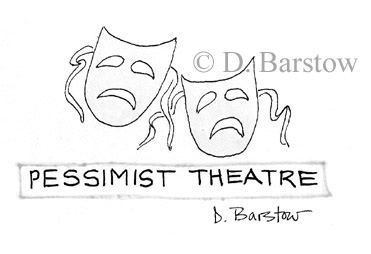
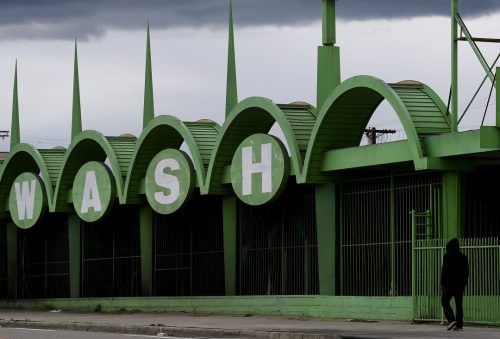
[…] I consider the right to breathe freely (and not to be forced to lose my identity by covering my face) is necessary for my Life, Liberty and Happiness. This is also a health issue: I run, to keep fit, and keep my immune system healthy. Running with a mask is a big no-no. […]
jib2ax
c40wz1
onzy1c
jku846
hg1r57
ybz0qa